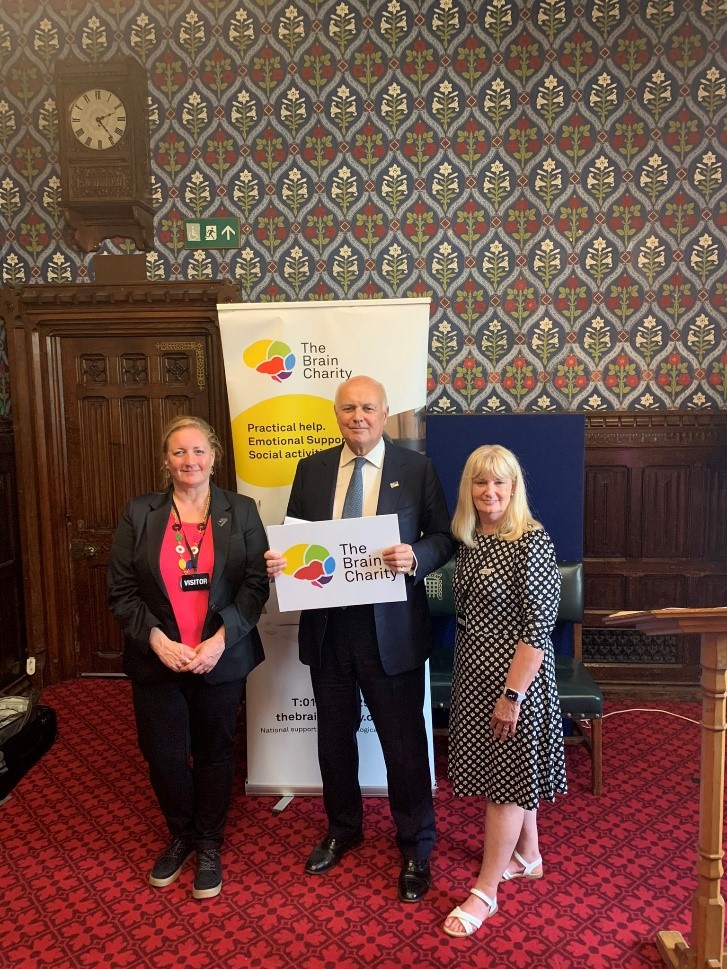ARC NWC Member the Brain Charity launches diagnosis report in Parliament

On 6th September 2023 I attended a Parliamentary event with ARCNWC member The Brain Charity.
The purpose of the event was the launch of a report which examines the journey to and impact of diagnosis of neurological conditions.
The ‘It’s all in your head‘ report was created following a survey conducted by The Brain Charity, an organisation which provides support for anyone based in the UK with a neurological condition, and their family, friends and carers.
There are more than 600 neurological conditions, including Motor Neurone Disease (MND), stroke, dementia and cerebral palsy. It is estimated that 1 in 6 people are living with a neurological condition in the UK.
More than 800 people affected by neurological conditions responded to the survey to share their diagnosis experiences.
The research finds delayed diagnosis and misdiagnosis of neurological conditions are serious issues facing the UK, with failings costing the NHS money and impacting the broader economy.
According to the key themes of the report, the system as it stands is characterised by a lack of information and support for patients, long waits for diagnosis, and a preventable mental health crisis.
The It’s all in your head report found:
•48% of patients leave their first GP appointment not feeling well-informed
•37% wait more than two years for a diagnosis
•35% are diagnosed with depression or anxiety following the diagnosis of a neurological condition.
•The purpose of the Parliamentary event, hosted by Sir Chris Bryant MP, was a call to action, raising awareness among MPs of the challenges faced by those experiencing symptoms of neurological conditions. There were 24 MPs in attendance at the event, who pledged to back the 1 in 6 with neurological conditions.
Based on the findings of the survey, The Brain Charity is calling for an independent review into the themes highlighted in the report to address the issues faced by those living with neurological conditions.
The review should:
• Work with GPs and primary care professionals, as well as stakeholders across the sector and examine how they can use training and other opportunities to maintain and strengthen their understanding of neurological conditions, adapt their processes and improve the quality of care patients receive
• Include what information, support and advice is given to patients at the Primary Care stage, during and beyond diagnosis
• Explore how specialist mental health support can be provided for patients in a meaningful and timely manner
•Identify how public awareness and understanding of neurological conditions might be improved, to influence people seeking help for themselves and their families sooner.
•The Brain Charity also supports calls by The Neurological Alliance for UK governments to set up a Neuro Taskforce, to address the current issues facing the 1 in 6 who live with neurological conditions.
I am concerned about the findings of this report, and the potential missed opportunities to diagnose neurological conditions at an early stage. This has not changed since my husband’s diagnosis as it was me who highlighted my concerns of a diagnosis of Motor Neurone Disease to the GP.
I have been campaigning for many years after I lost my husband to MND and FTD (Frontal Temporal Dementia)in 2010. As I discussed with many MPs who attended the event on the day an independent review into diagnosis of neurological conditions is important. As a public Adviser for NIHR ARCNWC I understand the importance of gathering evidence-based information so that recommendations do not only improve diagnosis, which in turn could lead to improvement in quality of life for people living with neurological conditions, but a significant financial and operational one for the NHS.
My final ask was the dissemination and ultimately the implementation of these findings.
Pippa Sargent, CEO of The Brain Charity, said: “Some of the findings in the It’s all in your head report are stark. They paint a picture of isolation, fear and a failure to be taken seriously. For too many people, delays and a lack of information and support exacerbates what is already a harrowing journey.
“More than 1 million people are admitted to hospital per year with a neurological condition, with individuals often arriving at A&E at the point of crisis. Early diagnosis is key to reducing this number.
“We hope the publication of the report and our launch event at Houses of Parliament act as a catalyst for change. We are continuing to engage with organisations across sectors to make positive change a reality.”